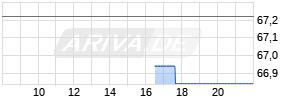Regulated information* - 13 July 2011 (08.10 a.m. CEST)
KBC Group confirms that, after careful and thorough consideration, it and the
Belgian authorities yesterday formally applied to the European Commission to
amend the strategic plan which was submitted on 30 September 2009 and which the
European Commission approved on 18 November 2009 (the 'EC Decision'). The
relevant notification has also been made to the National Bank of Belgium.
Due to the impact of certain changes in the regulatory environment (especially
Basel III and draft IFRS rules on leases) and the difficulty involved in
floating K&H in the current circumstances, some measures presented in the
initial plan have become less effective in achieving the intended aim. In their
application to the European Commission, KBC and the Belgian Authorities
therefore propose replacing those measures by others.
KBC and the Belgian Authorities formally applied to the European Commission for
its approval to replace the planned IPOs of a minority stake of CSOB Bank
(Ceskoslovenska obchodni banka, a. s., Czech Republic) and K&H Bank Zrt.
(Keresekedelmi es Hitelbank, Hungary) and the sale and lease back of KBC's
headquarter offices in Belgium by the divestment of KBC's Polish banking and
insurance subsidiaries, Kredyt Bank S.A. ('Kredyt Bank') and Towarzystwo
Ubezpieczen I Reasekuracji Warta S.A. ('Warta') (and their subsidiaries) and the
sale or unwind of selected ABS and CDO assets.
KBC believes that the amendments proposed in its application respect the legal
consistency of the EC Decision of 18 November 2009 and help the group achieve
its objectives. KBC's main objective is and remains to execute the plan within
the agreed timeframe and to repay the Belgian authorities in a timely manner.
The amendments proposed in the application to the European Commission are
expected to release the same amount of capital as the originally intended
measures.
KBC has prepared the application with great diligence following an open and
constructive dialogue with the European Commission. The European Commission's
decision is expected in the coming weeks. Meanwhile KBC continues to execute the
rest of its 2009 strategic plan.
Jan Vanhevel, KBC Group CEO added: 'The results of last year and of the first
quarter of 2011 prove that the fundamentals of the KBC group are solid and that
we have a sound business model. Over the last 19 months, we have made steady
progress in implementing the plan that was approved by the European Commission
in November 2009. KBC is gradually becoming a more focused and less complex
group, while maintaining economies of scale. Our group has more stable and
predictable earnings and an adjusted and reduced risk profile, while retaining
our growth options and the confidence of all our stakeholders. We remain firmly
committed to the bancassurance model which is at the core of our strategy and
which we continue to develop within our home markets. These strong fundamentals
will remain the cornerstone of our group's future.
However, as good business practice and a reflection of sound management, we
cannot and must not close our eyes to the changes around us, particularly the
changed regulatory environment, the impact on the effectiveness of some of the
measures foreseen in our initial plan and the consolidation trend recently
observed on the Polish financial market. Therefore, we see it as our duty and
responsibility towards all our stakeholders and particularly towards the Belgian
and Flemish governments to whom we made a commitment to redeem the government
securities within a reasonable timeframe, to investigate and propose alternative
measures. KBC is now looking forward to the European Commission's decision
regarding the amendments proposed in its formal application.'
1. Background to KBC's 2009 strategic plan
On 18 November 2009, the European Commission approved the asset relief and
restructuring plan for KBC Group under the European Commission Treaty state aid
rules. The plan foresees strategic and financial restructuring through the
divestment, run-down and listing of various businesses. The European Commission
was satisfied that the package of measures will ensure that KBC will bear a
significant portion of the restructuring costs, that it will restore the long-
term commercial viability of the group, and that it will tackle the distortions
of competition that result from the state aid.
KBC started executing the plan immediately after it was approved in November
2009 and committed to repaying the government securities through:
1. Generating profit (to strengthen the balance sheet) by building on the
strengths of its core bancassurance activities in its home markets, targeted
towards retail and SME customers and local mid-caps;
2. Reducing risk weighted assets (RWA) and thus freeing up capital (primarily
through reducing the international loan book outside KBC's home markets and not
linked to key customers); KBC has currently executed more than half of the
planned 39-billion-euro reduction in RWA;
3. Divesting a number of non-core assets; several divestments have already
been announced and closed in the course of 2010 and 2011 (e.g. Centea, Peel
Hunt, Secura, KBC Business Capital, KBC Asset Management UK and Ireland, KBC
Securities Baltic Investment Company, several entities of KBC Financial
Products);
4. Financial restructuring measures such as the IPOs of a minority share
(maximum 40%) of CSOB Bank (Czech Republic) and K&H Bank (Hungary), and the sale
and lease back of KBC's headquarter offices in Belgium.
2. External factors impacting the effectiveness of KBC's strategic plan
Over the last 19 months, the environment and the world around us have changed
and they continue to change. KBC constantly and closely monitors changes in the
financial markets that could influence the implementation of its strategic plan.
By the end of 2010, when new Basel III and draft IFRS rules on leases were
announced, it became clear that the impact of some of the Basel III rules would
render certain measures presented in the initial strategic plan less effective
in achieving the intended aim of raising sufficient capital to redeem the
government securities in a timely manner and to ensure that KBC itself
contributes an appropriate amount to the costs of its restructuring.
Consequently, in its application to the European Commission, KBC has proposed
replacing those measures by others.
1. Impact of Basel III Standards on the CSOB and K&H IPOs
The Bank for International Settlements' report 'Basel III: A global regulatory
framework for more resilient banks and banking systems (Basel III standards)'
foresees changes in the recognition of minority interests (i.e. non-controlling
interests) and other capital issued out of consolidated subsidiaries that is
held by third parties. This report - with detailed interpretations of minority
treatment under Basel III - was published in December 2010. These changes will
significantly lower the positive capital impact of floating minority stakes of
CSOB Bank and K&H Bank. Although the listing of the two banks could still be a
way to raise capital and provide own contribution to restructuring, the result
on KBC's capital position and solvency is facing a more stringent effect under
Basel III than initially planned and desired.
2. Impact of Hungarian banking tax on the K&H IPO
In addition to the negative impact of new Basel III regulation on the
recognition of minority interests, the IPO of K&H Bank would also be seriously
hampered in the coming years by the introduction of the banking tax in Hungary.
In 2010, the tax reduced the net profit of K&H Bank by more than one third, and
it will continue to have a substantial impact on the net profit of K&H Bank in
2011 and 2012. Political discussions on the future levels of this tax are
ongoing but as it currently stands it is not expected to be completely phased
out in the coming years. The reduction in the net profit of K&H Bank on account
of the banking tax makes a listing of a minority stake of K&H very difficult.
3. Impact of the change in IFRS Accounting Standards for leases on the
sale and lease back of KBC's headquarter offices
Current IFRS rules allow for the release of capital requirements related to real
estate where an operational rather than a financial lease is arranged following
an asset sale or a sale and lease-back transaction. However, new rules are being
drafted in the scope of a project aimed at developing a new single approach to
lease accounting that would ensure that all assets and liabilities arising under
lease contracts are recognised in the statement of financial position (balance
sheet). The new IFRS Standards on leases* aim to abolish entirely the current
distinction between financial and operational leases. Under the new IFRS
Standards on leases, all 'right-of-use' included in rental contracts will need
to be recorded as an asset with an expected 100% capital weight (the same as
real estate). As a result of these new standards, the anticipated sale and lease
back of KBC's headquarter offices in Belgium would not release any capital.
*The International Financial Reporting Standards Foundation published the IFRS
Exposure Draft ED/2010/9 Leases in August 2010 ('New IFRS Standards').
3. Alternative measures proposed
KBC is conscious of its commitment not only to achieve the intended capital
release through financial restructuring measures (thereby ensuring an
appropriate contribution by KBC to the costs of its restructuring) but also to
ensure the timely repayment of the government securities. Therefore, KBC has
investigated its options and together with the Belgian authorities has formally
applied to the European Commission for its approval of the divestment of Kredyt
Bank and Warta, as well as the sale or unwind of selected ABS and CDO assets
instead of the listings of CSOB Bank (Czech Republic) and K&H Bank (Hungary) and
the sale and lease-back transaction for its headquarter offices in Belgium. The
decision to selectively sell ABS assets and selectively unwind some CDOs
reflects improved market conditions and a return of liquidity for such
instruments, which will allow KBC to release substantial amounts of capital
(certainly in view of CRD3) at no or limited loss to the group.
* This news item contains information that is subject to the transparency
regulations for listed companies.
Poland_130711_ENG:
http://hugin.info/133947/R/1530411/465665.pdf
This announcement is distributed by Thomson Reuters on behalf of
Thomson Reuters clients. The owner of this announcement warrants that:
(i) the releases contained herein are protected by copyright and
other applicable laws; and
(ii) they are solely responsible for the content, accuracy and
originality of the information contained therein.
Source: KBC Groep via Thomson Reuters ONE
[HUG#1530411]
Top-News
KBC Group formally applies to European Commission to amend its 2009 strategic plan
Mittwoch, 13.07.2011 08:15 von Hugin - Aufrufe: 172
Werbung
Mehr Nachrichten kostenlos abonnieren
E-Mail-Adresse
Bitte überprüfe deine die E-Mail-Adresse.
Benachrichtigungen von ARIVA.DE
(Mit der Bestellung akzeptierst du die Datenschutzhinweise)
(Mit der Bestellung akzeptierst du die Datenschutzhinweise)
-1

Vielen Dank, dass du dich für unseren Newsletter angemeldet hast. Du erhältst in Kürze eine E-Mail mit einem Aktivierungslink.
Hinweis: ARIVA.DE veröffentlicht in dieser Rubrik Analysen, Kolumnen und Nachrichten aus verschiedenen Quellen. Die ARIVA.DE AG ist nicht verantwortlich für Inhalte, die erkennbar von Dritten in den „News“-Bereich dieser Webseite eingestellt worden sind, und macht sich diese nicht zu Eigen. Diese Inhalte sind insbesondere durch eine entsprechende „von“-Kennzeichnung unterhalb der Artikelüberschrift und/oder durch den Link „Um den vollständigen Artikel zu lesen, klicken Sie bitte hier.“ erkennbar; verantwortlich für diese Inhalte ist allein der genannte Dritte.
Andere Nutzer interessierten sich auch für folgende News
Kurse
 |
Werbung
Weiter abwärts?
| Kurzfristig positionieren in KBC Groep | ||
|
UK9591
| Ask: 0,59 | Hebel: 6,47 |
| mit moderatem Hebel |
Zum Produkt
| |

UBS
Den Basisprospekt sowie die Endgültigen Bedingungen und die Basisinformationsblätter erhalten Sie hier: UK9591,. Beachten Sie auch die weiteren Hinweise zu dieser Werbung. Der Emittent ist berechtigt, Wertpapiere mit open end-Laufzeit zu kündigen.




